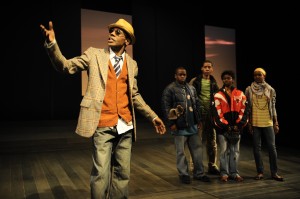The Lost Boys meet the American dream in a new Chicago play that relies on stereotype in order to critique it
By Jennifer Swann

“The Lost Boys of Sudan,” written by Lonnie Carter and directed by Jim Corti, both of whom have lengthy Chicago-based theater credits, premiered March 19th at the Victory Gardens Theater in Lincoln Park. The story of three Sudanese Lost Boys of the Dinka tribe who were orphaned during the Second Civil War is enacted on a sparse wood-paneled stage with video and image projections that evoke African landscapes.
Because the play is based on recent historical events, much of the first act is spent establishing the violent and confounding climate in Sudan and emphasizing the emotional and often identity-based struggles of the three Lost Boys, one of whom is a girl who must disguise herself in order to be saved in a refugee camp. The boys’ and girl’s struggles are drawn out through extensive monologues and drum-accompanied songs that are at times more educational than they are entertaining.
The kid-friendly production can sometimes feel like a politically-charged episode of Nickelodeon’s “Gulla Gulla Island” or “Yo Gabba Gabba!,” but even with its preaching of moral values and slam-poetry-like raps that poke at Sarah Palin and the differences between American and African culture, it is still difficult, as a theatergoer with limited prior knowledge of the conflicts in Sudan, to understand the context of the Lost Boys in the Second Civil War.
The second half of the play takes place in Fargo, North Dakota, as the three Lost Boys are adopted by an African American family that takes pride in American middle-class luxuries like microwaves and videogames. The American characters speak in Seussian rhymes that remind us of their love for Ikea, basketball, and Hummers, while the Lost Boys dream about the Wild Wild West and wonder why there are no black cowboys in America.
Soon enough, The Lost Boys are playing basketball, listening to Snoop Dogg, texting, getting asked to the prom, and playing video games that remind them of their own trauma in Sudan. Despite its potential to make an affecting comment on the experience of immigration, assimilation, and Diaspora, “The Lost Boys of Sudan” instead falls into the all too familiar plotline about people from another culture humorously trying to adjust to life, in this case, in suburban Midwest America.
Victory Gardens Biograph Theater, 2433 N. Lincoln Avenue, Chicago
773.871.3000
victorygardens.org







I’ve been surfing online more than three hours today, yet I never found any interesting article like yours. It’s pretty worth enough for me. In my view, if all website owners and bloggers made good content as you did, the net will be a lot more useful than ever before.